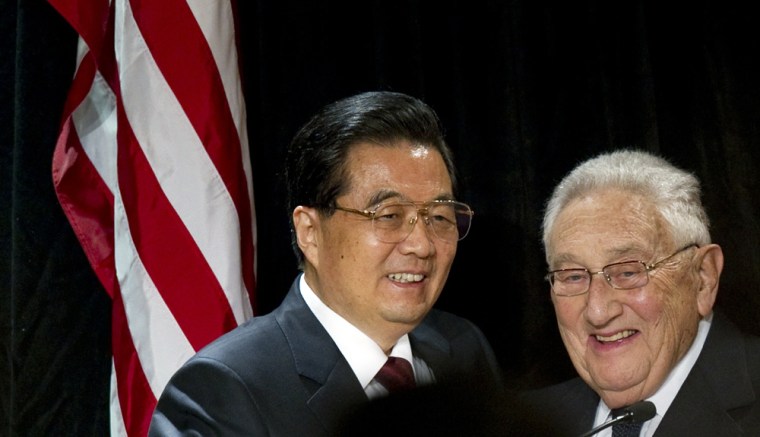Chinese President Hu Jintao denied his country is a military threat despite its arms buildup and pressed the U.S. on Thursday for closer cooperation between the global powers. He urged the United States to treat China "with respect and as equals" after encountering a fresh barrage of criticism from lawmakers over human rights.
In a luncheon speech to American business executives, Hu also urged the U.S. to continue to recognize China's sovereignty over Taiwan and Tibet.
"China-U.S. relations will enjoy smooth and steady growth when the two countries handle well issues involving each other's major interests. Otherwise, our relations will suffer constant trouble or even tension," Hu said as he wrapped up his state visit to Washington.
The Chinese leader headed next to Chicago where he was dining Thursday evening with retiring Mayor Richard Daley, Illinois Gov. Pat Quinn and business leaders. On Friday, he visits a Chinese center at a high school and a Chinese auto parts producer.
Hu, speaking to the Thursday dinner through a translator, praised the city's efforts to build relationships through language and business.
"Despite the great distance between Chicago and China, our hearts are linked together by friendship," he said. He earlier congratulated Daley on his 22 years in office, calling him "the most senior mayor in America."
"Our long range goal is to make Chicago the most China-friendly city in the U.S.," Daley said.
On Hill, U.S. lawmakers raise rights concerns
Earlier in the day, U.S. lawmakers say they complained about human rights abuses in China as they met with Hu, a day after the communist leader conceded that the country needed to improve its rights record.
Hu met with lawmakers and separately with House of Representatives and Senate leaders. On Wednesday he was welcomed at the White House on a high-profile state visit intended to ease mistrust between the two superpowers.
House Speaker John Boehner said participants at the House meeting with Hu "raised our strong, ongoing concerns with reports of human rights violations in China, including the denial of religious freedom and the use of coercive abortion" as a result of China's one-child policy.
He said they also addressed the need for China to better protect intellectual property and curtail the aggressive behavior of North Korea.
Hu also met with Senate Majority Leader Harry Reid, who on Wednesday called Hu "a dictator" in an interview, although he later tried to recant the comment. During the state visit, several Republican lawmakers have also assailed the Chinese government's record on human rights, military expansion, financial strategy and weapons sales.
China media focus on pomp, ceremonyIn China, state media lapped up the pomp and ceremony of Hu's visit but largely avoided mention of the rare joint news conference in Washington, where Hu answered questions on the yuan and human rights.
Newspapers splashed photos of Hu with Obama across their front pages, with headlines touting a "new chapter in relations" and "leaders hail symbiotic ties."
Online, China's popular chat rooms and blogs brimmed with pride after China agreed to buy $45 billion worth of U.S. goods, deals that seemed aimed at quelling anti-Chinese sentiment in the United States.
"You capitalist-minded Obama, you're not that great!" said a blogger on Sina Microblog, the Chinese version of Twitter. "It's our socialist-minded Boss Hu who is wealthy! As a Chinese, I feel immense pride!"
"Hu's visit injects new blood into the tug-of-war between China and the U.S.," wrote one poster on the tianya.cn portal. "China is showing its strength to the whole world."
Human rights coverage censoredBeijing residents said BBC and CNN television broadcasts of the summit went blank when the topic switched to human rights and anti-Chinese protesters, though access to foreign news channels is restricted to upscale hotels and apartment complexes.
It appeared that one Chinese censor was endeavoring to prevent pictures of imprisoned dissident Liu Xiaobo in a BBC World news report about Hu's visit from being shown, and in doing so also blocked part of Hu's comments about human rights, according to a Western journalist. However, Hu's remarks were allowed to be broadcast on other channels.
U.S. manufacturers assert that China undervalues its currency by as much as 40 percent, making its exports cheaper at the expense of those from America, contributing to high U.S. unemployment.
Since 2005, lawmakers have threatened legislation that would punish Chinese goods with duties to this, but they have yet to pass a law.
So far China has resisted demands for faster appreciation of the yuan, a move that could help lower China's trade surplus with the United States, which Washington puts at $270 billion.
Obama looked to assure Americans that they should not fear China's economic rise as he used Hu's visit to announce job-creating business deals worth $45 billion and more than 200,000 jobs to U.S. companies.
Hu sought to address another big American concern Wednesday as he conceded that "a lot still needs to be done" to improve China's record on human rights.
Five years after his last visit to the White House, which was marred by protocol blunders, Hu was feted this time with the full pomp of a state visit including a lavish dinner with some of Washington's most powerful figures and other luminaries.
